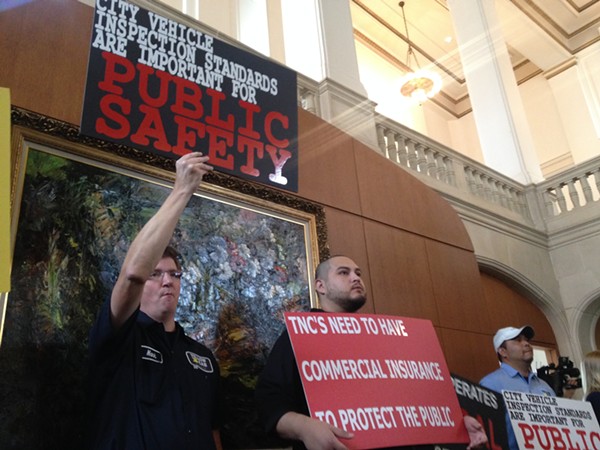
Alexa Garcia-Ditta | San Antonio Current
The City is holding two public meetings seeking resident input on ride-hailing companies.
San Antonio was on the forefront of the ride-hailing debate in Texas.
Companies like Uber and Lyft danced with the Alamo City over insurance regulations and fingerprint background checks during a tense standoff between the ride-hailing companies, traditional vehicle-for-hire businesses like taxis and a divided City Council.
In the end, there was a compromise. Lyft and Uber, which ceased operation in the Alamo City when it passed an ordinance requiring fingerprint background checks, came back to the table to operate under a pilot program that made those checks optional. But those who chose to undergo the fingerprinting — there were hardly any takers — would received special verified status from the City.
Uber agreed to the pilot program last October, meaning its time runs out in July. Lyft started operations later, in December, giving that ride-hailing company until September to operate under the temporary deal.
San Antonio will host two roundtables in the coming weeks to obtain public input:
Wednesday, May 18, 2016 St. Margaret Mary’s Church Activity Center 5:30-7 p.m. 1314 Fair Ave San Antonio, TX 78223There is also an online survey where residents can provide feedback.
Wednesday, June 1, 2016 TriPoint YMCA Grantham Hall 5:30-7 p.m. 3233 N St Mary’s Street San Antonio, TX 78212
The City wants to know whether residents think rules should be the same for ride-hailing companies as the traditional vehicle-for-hire industry or if the companies should be able to continue to operate differently.
Meanwhile, Uber and Lyft are playing that tired dance with Austin, after voters rejected loosening regulations over the weekend. And it looks as if there will be another attempt at the state level to provide comprehensive rules for the ride-hailing industry that supersede local control.

